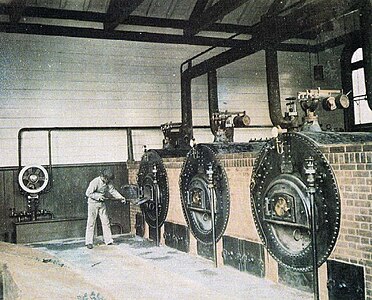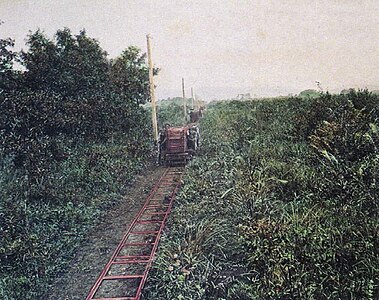Henry Spencer Palmer
Henry Spencer Palmer | |
|---|---|
 Henry Spencer Palmer | |
| Born | 30 April 1838 Bangalore, British India |
| Died | 10 February 1893 (aged 54) House at Azabu, 41 Imai-cho, Azabu, Tokyo, Japan[1] |
| Buried | Aoyama Cemetery, Tokyo, Japan |
| Allegiance | |
| Branch | British Army |
| Years of service | 1856–1887 |
| Rank | Major General |
| Service number | 949[2] |
| Unit | Corps of Royal Engineers[3] |
| Commands | Chief Astronomer, Transit of Venus expedition to New Zealand, 1874–75[3] CRE, Manchester, 1883-85[3][4] |
| Known for | Foreign advisor to Meiji Japan |
| Awards |
|
| Memorials | Monument, Yokohama Waterworks, Japan, 1939[6] Bronze bust, Nogeyama Park, Yokohama, Japan, 1987 |
| Spouse(s) |
Mary Jane Pearson Wright
(m. 1863) |
| Relations | Henry James (uncle) |
| Other work | Civil engineer, Japan |
Major General Henry Spencer Palmer FRAS (30 April 1838 – 10 February 1893) was a British Army military engineer and surveyor, noted for his work in developing Yokohama harbor in the Empire of Japan as a foreign advisor to the Japanese government
Biography
[edit]Henry Palmer was born at Bangalore, British India, on 30 April 1838; the youngest son of John Freke Palmer, then a major of the 32nd Native Infantry, Madras Army, and Jane James, a daughter of John James of Truro, Cornwall, and sister of then Lieutenant Henry James, Royal Engineers. Jane died at Bangalore on 24 May 1838, less than a month after Henry's birth.[7][5]
Palmer was educated at private schools in Bath in England and by tutors before being admitted in January 1856 to the Royal Military Academy, Woolwich.
He was commissioned as a lieutenant of the Royal Engineers on 20 December 1856 and studied for a year at the Royal Engineers Establishment, Chatham. In October 1858, he was assigned to British Columbia, Canada, as part of a survey mission. In addition to undertaking several exploratory surveys, he laid out trails, supervised road construction, and inspected road-works. He was commended for his efforts, and during his stay in Canada also contributed papers on British Columbia to the Royal Geographical Society in London. In November 1863, one month after marriage at New Westminster on 7 October, he and his 15-year-old Canadian wife, Mary Jane Pearson Wright (17 January 1848–10 January 1934), daughter of the Ven. Henry Press Wright, Archdeacon of Columbia, and Ann Nalder, sailed for England.
From 1864 and 1874 Palmer served with the Ordnance Survey of Great Britain. Palmer was well known not only as a soldier but also as a scientist. From 1874, he undertook various postings as a surveyor, civil engineer, and astronomer in New Zealand, Barbados, Hong Kong, and Japan. At some point before Palmer headed out for Japan, he and his wife parted. She returned to her native British Columbia where she lived for the rest of her life.
After retiring from the Royal Engineers in 1887, he settled in Japan, established a successful civilian practice in Yokohama, where he was hired by the Japanese government to develop designs for the harbor, Ōsanbashi Pier and the city waterworks.[8] He was also a frequent contributor of letters and articles to the Japan Times, Japan Weekly Mail and other newspapers and periodicals, and was also a correspondent for The Times. He also wrote a profusely illustrated guidebook to Japan, "Letters from the Land of the Rising Sun".
At some point around 1890, he remarried to a refined Japanese woman, Uta Saito, with whom he had a daughter.[1]
After his death in 1893 from typhoid fever, he was buried at the Aoyama Cemetery in Tokyo.
A bronze bust of Palmer was unveiled by the Yokohama Water Works in 1987 to commemorate the centennial of its foundation. The Yokohama Archives of History also held a special exhibition in his honor the same year.
-
Yokohama Water Works: Boiler at the intake, Mi-i Village, 1886–87
-
Yokohama Water Works: Pump at the intake, Mi-i Village, 1886–87
-
Yokohama Water Works: Iron pipeline route, Sagami-hara Tsumara Village, 1886–87
-
Yokohama Water Works: Iron pipeline route, Kawajiri Village, 1886–87
-
Yokohama Water Works: Iron pipeline route, 1886–87
-
Yokohama Water Works: Filtre beds at Nogeyama, 1886–87
-
Yokohama Water Works: Ogurano ferry, 1886–87
-
A bronze bust of Palmer, Nogeyama Park, Yokohama
See also
[edit]Publications
[edit]- Palmer, Henry Spencer (1873). The Ordnance Survey of the Kingdom; Its Objects, Mode of Execution, History, and Present Condition. London: Edward Stanford.
- Palmer, Henry Spencer (1875). "The State of the Surveys in New Zealand, (Correspondence Relative to, and Report by Major Palmer on.)". Appendix to the Journals of the House of Representatives (1875 Session I, H-01).
- Palmer, Henry Spencer (1876). "Telegraphic Differences of Longitude, (Reports on, Between Various Places in New Zealand.)". Appendix to the Journals of the House of Representatives (1876 Session I, H-06).
- Palmer, Henry Spencer (1876). "On Recent American Determinations of Geographical Positions in the West Indies and Central America". Monthly Notices of the Royal Astronomical Society. 36 (7, May 1876). London: Royal Astronomical Society: 300–305. doi:10.1093/mnras/36.7.300.
- Palmer, Henry Spencer (1878). Sinai: From the Fourth Egyptian Dynasty to the Present Day. Society for Promoting Christian Knowledge.
- Airy, George Biddell; Tupman, George Lyon; Browne, Charles Orde; Neate, Charles Burnaby; Perry, Stephen Joseph; Palmer, Henry Spencer (1881). "Part V. Expedition to New Zealand Under Major H. S. Palmer, Royal Engineers". Account of Observations of the Transit of Venus, 1874, December 8: Made Under the Authority of the British Government: and of the Reduction of the Observations (PDF). London: H.M. Stationery Office.
- Palmer, Henry Spencer (1894). Letters from the Land of the Rising Sun. Yokohama: "Japan Mail" Office.
References
[edit]- ^ a b "The House at Azabu (2) Two British Japanophiles" (PDF). Abazu: Community Information Paper. Vol. 29. December 2014. p. 6.
- ^ Connolly, Thomas William John (1898). Richard Fielding Edwards (ed.). Roll of Officers of the Corps of Royal Engineers from 1660 to 1898. Chatham: The Royal Engineers Institute. p. 20.
- ^ a b c d e WO 25/3913/311: Statement of the Services of Henry Spencer Palmer of the Royal Engineers with a Record of such other Particulars as may be useful in case of his Death, The National Archives, Kew, p. 311
- ^ Hart, Henry George (1884). The New Army List, Militia List, Yeomanry Cavalry List and Indian Civil Service List, for 1884. Vol. 45. London: John Murray. p. 206.
- ^ a b Higuchi, Jiro (2002). The Biography of Major-General Henry Spencer Palmer R.E. F.R.A.S. (1838–1893) (PDF). Tokyo: Jiro Higuchi.
- ^ Anonymous (1939). "Major-General Henry Spencer Palmer and the Yokohama Waterworks" (PDF). The Royal Engineers Journal. 53 (December 1939). Chatham: The Institution of Royal Engineers: 495–496.
- ^ Asylum Press. The Madras Almanac and Compendium of Intelligence, for 1839 (PDF). Madras: Edmund Marsden. p. 428.
- ^ Sabin, Burritt (2002). A Historical Guide to Yokohama (2nd ed.). Yokohama, Japan: Yurindo Co., Ltd. p. 53. ISBN 4-89660-172-6.
- Anonymous (1893). "Obituary: Major-General Henry Spencer Palmer, 1838–1893". Minutes of the Proceedings of the Institution of Civil Engineers. 113 (1893, Part 3). Institution of Civil Engineers: 373–375. doi:10.1680/imotp.1893.20472.
- Anonymous (1894). "Obituary: Major-General Henry Spencer Palmer, R.E." Monthly Notices of the Royal Astronomical Society. 54 (4, February 1894). London: Royal Astronomical Society: 196–198. doi:10.1093/mnras/54.4.196 (inactive 23 August 2024).
{{cite journal}}: CS1 maint: DOI inactive as of August 2024 (link) - Higuchi, Jiro (2002). "18. Henry Spencer Palmer, 1838–93". In Cortazzi, Hugh (ed.). Britain & Japan: Biographical Portraits. Vol. 4. The Japan Society; Global Oriental Publishing. pp. 198–212. ISBN 190335014X.
- Higuchi, Jiro (2002). The Biography of Major-General Henry Spencer Palmer R.E. F.R.A.S. (1838–1893) (PDF). Tokyo: Jiro Higuchi.
External links
[edit]- 1838 births
- 1893 deaths
- Graduates of the Royal Military Academy, Woolwich
- Royal Engineers officers
- British explorers of North America
- Explorers of British Columbia
- Pre-Confederation British Columbia people
- Transit of Venus
- 19th-century British astronomers
- 19th-century New Zealand astronomers
- Fellows of the Royal Astronomical Society
- Foreign advisors to the government in Meiji-period Japan
- Recipients of the Order of the Rising Sun, 3rd class
- British Army major generals
- British expatriates in Japan
- Deaths from typhoid fever in Japan
- Burials at Aoyama Cemetery








